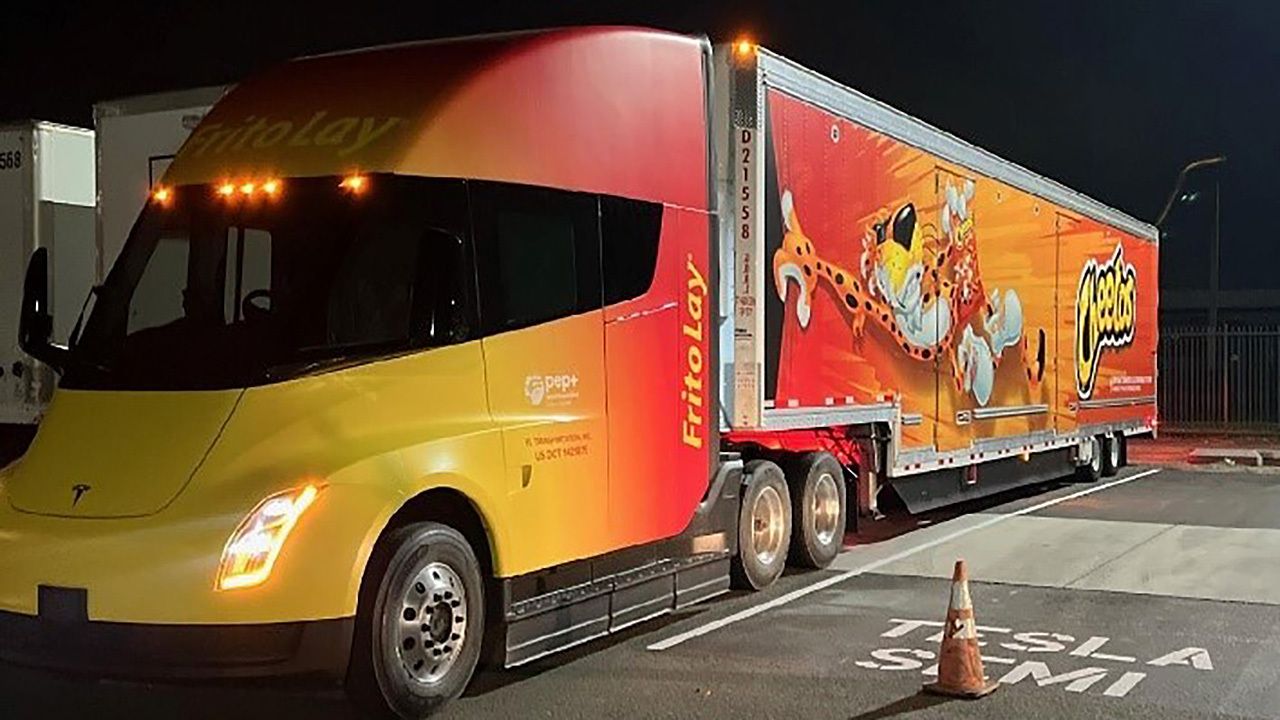Tesla's flashy new electric Semi truck isn't very practical for most freight haulers under pressure to reduce their carbon footprint.
Why it matters: Driving what CEO Elon Musk calls "the most bad-ass rig on the road" doesn't matter to commercial truck operators, who are worried about hitting tougher emissions targets as well as long-term reliability and total cost of ownership.
- Other technologies, including natural gas, hydrogen fuel cells and even a proposal to use cleaner-burning, plant-based fuels in traditional diesel engines could offer better solutions.
Driving the news: Tesla last week delivered the company's first heavy-duty Semi to PepsiCo's Modesto, Calif., factory.
- After taking delivery, PepsiCo completed its first cargo run by delivering snacks from its Frito-Lay subsidiary to those attending Tesla's launch event in Nevada.
- Musk said the Semi completed a 500-mile drive on a single charge, with the Semi and cargo weighing in at 81,000 total pounds.

Yes, but: Tesla omitted crucial information, including the truck's empty weight — an important consideration for measuring its efficiency.
- A Tesla Semi "fully loaded" with Doritos can go farther than a truck packed with cases of Pepsi.
- "Not very impressive — moving a cargo of chips (average weight per pack 52 grams) cannot in any way be said to be definitive proof of concept," said Oliver Dixon, senior analyst at consultancy Guidehouse, per Reuters.
Be smart: There's a basic physics problem with electric trucks that goes straight to operators' bottom line.
- Hauling a fully-loaded 18-wheel tractor down the highway requires a lot of electricity. But batteries are big, heavy and expensive.
- The larger the battery, the less cargo the truck can carry. The heavier the cargo, the shorter the driving range. Less cargo and range usually means less profit.
- Electric trucks can make sense, but usually for shorter runs or smaller loads.
The alternatives: One Bill Gates-backed startup, ClearFlame, is promoting a simpler way for freight haulers to meet sustainability goals using their existing diesel trucks.
- ClearFlame’s engine modification technology aims to "take the dirty diesel fuel out of diesel engines" and replace it with cleaner-burning plant-based fuels, like ethanol, methanol or ammonia.
- The system is 30% to 40% less expensive than diesel, electric, natural gas or hydrogen on a total cost of ownership basis, co-founder and CEO BJ Johnson tells Axios.
By the numbers: ClearFlame estimates its system produces 42% lower carbon emissions than diesel, and 22% lower than battery electric vehicles, based on the country's average mix of renewables and fossil fuels.
How it works: In a typical diesel engine, diesel fuel is injected into the combustion chamber and ignited by hot compressed air.
- Alternative fuels like ethanol and methanol require higher temperatures to burn.
- ClearFlame's solution — with a few minor engine modifications — is to pipe the truck's hot exhaust back into the combustion chamber, a system known as exhaust gas recirculation (EGR).
- The technology is being tested in pilot fleets using ethanol, a widely-available fuel.
The bottom line: It's likely to take a mix of new technologies for truckers to cut emissions and meet sustainability targets.







